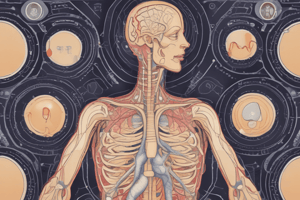Podcast
Questions and Answers
What are target cells in the endocrine system?
What are target cells in the endocrine system?
- Cells that produce hormones
- Cells that regulate blood composition
- Cells that are part of the nervous system
- Cells with specific receptors for particular hormones (correct)
Which hormone is primarily involved in maintaining blood glucose levels?
Which hormone is primarily involved in maintaining blood glucose levels?
- Growth hormone
- Gastrin
- Prolactin
- Insulin (correct)
How does the endocrine system primarily communicate with distant organs?
How does the endocrine system primarily communicate with distant organs?
- By direct cellular contact
- By releasing hormones into the circulatory system (correct)
- By secreting neurotransmitters
- Through nerve impulses
What distinguishes autocrine hormones from paracrine hormones?
What distinguishes autocrine hormones from paracrine hormones?
What is the primary function of the hypothalamus in the endocrine system?
What is the primary function of the hypothalamus in the endocrine system?
Flashcards
Endocrine System
Endocrine System
A system of glands that release hormones into the bloodstream to regulate distant organs and processes.
Hormones
Hormones
Chemical messengers released by endocrine glands that affect target cells in distant parts of the body.
Target Cells
Target Cells
Cells that have specific receptors for a particular hormone.
Endocrinology
Endocrinology
Signup and view all the flashcards
Homeostasis
Homeostasis
Signup and view all the flashcards
Study Notes
Endocrine System Overview
- The endocrine system is a messenger system composed of hormones released by internal glands into the circulatory system.
- These hormones target and regulate distant organs.
- In vertebrates, the hypothalamus is the control center for all endocrine systems.
Endocrine System Objectives
- Identify the main functions of the endocrine system.
- Compare endocrine signaling to nervous system signaling.
- Describe how hormones interact with target cell receptors.
- Discuss the major endocrine glands and their functions.
- Discuss the stress response as an example of neuroendocrine signaling.
Endocrine Glands
- Major endocrine glands include the pituitary, thyroid, parathyroid, adrenal, pancreas, ovaries, and testes.
- The hypothalamus, pancreas, and thymus also function as endocrine glands.
Hormones and Their Functions
- Hormones are mediators released in one body part, regulating cells in other parts by binding to receptors.
- These mediators control development, growth, metabolism, blood composition/volume, digestion, and reproductive activities.
- Hormones include growth hormone, insulin, gastrin, prolactin, etc.
Local Hormones
- Autocrine hormones act on the same cells that produced them.
- Paracrine hormones act on neighbouring cells.
Circulating Hormones
- Circulating hormones are carried through the blood to act on distant target cells.
Neural vs. Endocrine Signaling
- Endocrine system uses chemical signals (hormones), with fast or slow response times and widespread effects.
- Nervous system uses electrical and chemical signals (neurotransmitters), with always fast and localized effects.
Nervous vs Endocrine systems
- The nervous system is responsible for quick responses to rapid changes in the external environment.
- The endocrine system is responsible for maintaining homeostasis and controlling reproduction by slower-acting mechanisms.
The Stress Response
- Stress is any potential or actual threat to homeostasis.
- The stress response activates the sympathetic nervous system (fight-or-flight response) and the hypothalamic-pituitary-adrenal (HPA) axis to respond to the stressor.
Hypothalamic-Pituitary-Adrenal (HPA) Axis
- The hypothalamus is a major link between the nervous and endocrine systems.
- It releases corticotrophin-releasing hormone (CRH).
- CRH activates the release of adrenocorticotropic hormone (ACTH) from the anterior pituitary.
- ACTH activates the adrenal glands to produce cortisol, the major stress hormone.
Cortisol Effects
- Short-term effects include increased heart rate, blood pressure, memory, and glucose release. It also affects muscle catabolism, bone breakdown, and immunity.
- Long-term effects include an increased risk of heart disease, hypertension, osteoporosis, cancer, memory problems, depression, anxiety, diabetes, muscle wasting, and obesity.
Negative Feedback Control of Cortisol
- High cortisol levels trigger sensors in the brain to turn off the stress response.
- Chronic stress can impair this negative feedback mechanism, causing the body to continuously produce cortisol.
Pancreas
- The pancreas releases insulin (decreases glucose), and glucagon (increases glucose).
- The exocrine function of the pancreas involves acinar cells secreting digestive enzymes into the small intestine.
Gonads
- The testes secrete testosterone.
- The ovaries secrete estrogen and progesterone.
- These hormones control reproductive processes.
Pituitary Gland
- The pituitary gland is small, pea-sized.
- It secretes hormones including growth hormone, prolactin, oxytocin, and antidiuretic hormone.
Pineal Gland
- The pineal gland produces melatonin.
- Melatonin regulates the circadian rhythm (sleep-wake cycle).
Thyroid and Parathyroid Glands
- The thyroid gland produces thyroid hormone (T3 and T4), increasing metabolism.
- The parathyroid glands produce parathyroid hormone, regulating blood calcium levels.
Adrenal Glands
- The adrenal glands are located superior to the kidneys and secrete epinephrine and norepinephrine (stress hormones).
- The adrenal glands also secrete cortisol.
Understanding the relationships between the nervous and endocrine system
The endocrine and nervous systems work together to regulate bodily functions. The interaction between the two is particularly evident in the stress response, in which the nervous system triggers the endocrine system to produce hormones necessary to adapt to stressful situations.
Studying That Suits You
Use AI to generate personalized quizzes and flashcards to suit your learning preferences.




